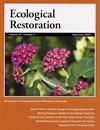Long Term Progress in Riparian Restoration with Concurrent Avian Declines in the Southern San Francisco Bay Area (CA)
IF 1.1
4区 环境科学与生态学
Q2 ECOLOGY
引用次数: 1
Abstract
ABSTRACT The restoration of riparian habitats aims to provide habitat for birds and other environmental benefits; yet the evaluation of long-term outcomes is rare. To address this knowledge gap, we used bird and vegetation data from Coyote Creek Field Station (CCFS), in the southern San Francisco Bay Area, to assess the progress of two riparian revegetation projects (1987 Revegetation, 1993 Revegetation) over nearly two decades. Restoration success was measured by changes in 1) vegetation structure and composition, and 2) avian abundance, diversity, and community composition. We compared the two revegetated areas to a remnant riparian reference site and a managed floodplain overflow channel in three time periods (1996–1998, 2004–2006, 2012–2014) using ANOVA, Tukey’s HSD tests, and beta diversity analysis of avian community composition. Over time, the restored areas became more similar to the remnant riparian reference site in four of seven indices. The avian community became more similar across the habitat areas over time, although differences remained. Migratory birds declined across all habitat areas, while resident and wintering birds declined in one revegetated habitat only. Overall we found that different types of data told different stories, indicating both convergence with the reference site and ongoing differences. Our findings highlight the need for multifaceted approaches to evaluating restoration success.旧金山湾区南部河岸恢复与同时发生的鸟类减少的长期进展(CA)
河岸栖息地的恢复旨在为鸟类提供栖息地和其他环境效益;然而,对长期结果的评估却很少。为了解决这一知识差距,我们使用了旧金山湾区南部Coyote Creek野外站(CCFS)的鸟类和植被数据,评估了近20年来两个河岸重新植被项目(1987年重新植被和1993年重新植被)的进展情况。恢复成功的衡量标准是1)植被结构和组成的变化,以及2)鸟类丰度、多样性和群落组成的变化。我们使用ANOVA、Tukey的HSD测试和鸟类群落组成的β多样性分析,在三个时间段(1996-1998、2004-2006、2012-2014)内,将两个重新植被区与一个残余河岸参考点和一个管理的泛滥平原溢流通道进行了比较。随着时间的推移,在七个指数中的四个指数中,恢复后的区域变得更类似于残留的河岸参考点。随着时间的推移,不同栖息地的鸟类群落变得更加相似,尽管差异仍然存在。候鸟在所有栖息地都有所减少,而留鸟和越冬鸟只在一个重新植被的栖息地减少。总的来说,我们发现不同类型的数据讲述了不同的故事,这表明与参考网站的一致性和持续的差异。我们的研究结果强调了评估修复成功率的多方面方法的必要性。
本文章由计算机程序翻译,如有差异,请以英文原文为准。
求助全文
约1分钟内获得全文
求助全文
来源期刊

Ecological Restoration
Environmental Science-Nature and Landscape Conservation
CiteScore
1.70
自引率
12.50%
发文量
24
期刊介绍:
Ecological Restoration is a forum for people advancing the science and practice of restoration ecology. It features the technical and biological aspects of restoring landscapes, as well as collaborations between restorationists and the design professions, land-use policy, the role of education, and more. This quarterly publication includes peer-reviewed science articles, perspectives and notes, book reviews, abstracts of restoration ecology progress published elsewhere, and announcements of scientific and professional meetings.
 求助内容:
求助内容: 应助结果提醒方式:
应助结果提醒方式:


